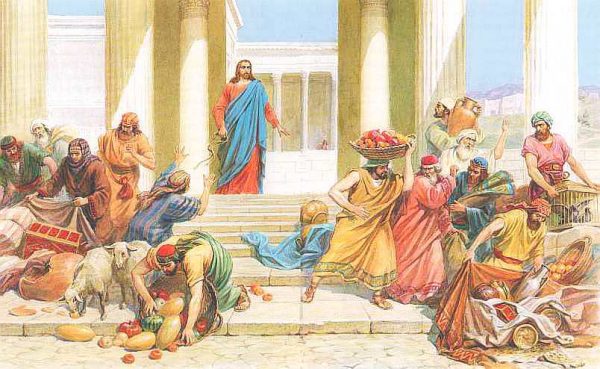In order to justify their offenses in general and in particular their wars, some resort to this text from the Gospel: “Then Jesus went into the temple and began to drive out those who bought and sold in the temple, and overturned the tables of the money changers and the seats of those who sold doves” (Mark 11:15 and equivalent passages in the other three Gospels). They put themselves in Christ’s place in the story and put their enemies in the place of those who deserve to be killed and expelled. But is there a way of reading this text that is closer to the mind of the fathers?
The fathers found in this event a warning for themselves and for Christians in general– not for others– that gives them guidance in order not to fall into temptation, in order not to become merchants who traffic in holy things rather than faithful servants of the Church according to God’s heart. They found that this event is concerned with them, the children of the Church, more than it concerns others who do not belong to the Church. Contrary to what happens today, they placed themselves in the place of the merchants, not in the place of Christ, so that they might benefit from repentance before Christ comes and expels them.
The fathers, then, asked their followers to be careful not to fall into the trap that the temple merchants fell, lest Christ come and expel them just as He expelled those who preceded them in defiling God’s temple. Saint Ambrose of Milan (d. 397) says, rejecting human infallibility, “God does not want His temple to be a market, but a house of holiness. He does not preserve the priestly ministry as a religious duty without sincerity, but as willful obedience… He taught that the Church should not make a place for worldly commerce, and so He expelled the money-changers in particular, those who seek profit from God’s money and are unable to distinguish between good and evil.”
The Venerable Bede (d. 735), a doctor of the church, also calls believers to repent and to not behave like the merchants and money-changers in the temple so that Christ will not come and expel them. Bede says, “Christ cast the merchants and con-artists and all their lot outside, along with all those who are attached to the goods of commerce… We must avoid evil actions with great care and diligent perseverance, lest Christ come suddenly and find something evil in us as a result of which we will truly be worthy of whipping and expulsion from the Church.”
Saint Irenaeus of Lyon (d. 202) affirms this patristic interpretation that calls for cleansing the temple of those who conduct commerce and wreak havoc within it. He employs a symbolic reading of the events and sees in the temple nothing other than the human body. “Do you not know that you are the temple of God and that the Spirit of God dwells in you? If anyone defiles the temple of God, God will destroy him. For the temple of God is holy, which temple you are” (1 Corinthians 3:16-17). So according to Irenaeus’ reading of the event, man is called to expel sin from his body and repent.
Origen (d. 235) has the same reading, as he states that, “He is zealous for God’s house in each one of us. He does not want the house of prayer to be a place for money-changers or to become a den of thieves, as He is the Son of a jealous God… These words make it clear that God does not want anything foreign to mix with His will in the soul of any one of us, especially the souls of those who desire to accept the teachings of the divine faith.”
According to these readings of the Church, we conclude that the fathers found in this passage a call to purify the Church from the money-changers who exploit their positions within it for their own interests and worldly purposes. Christ did not come to expel the children of foreign nations. He came and expelled from the temple the children of the temple who did not deserve to be children of the temple. This is confirmed by what Jesus said, citing the Old Testament: “My house shall be called a house of prayer for all nations? But you have made it a den of thieves” (Mark 11:17).
Is it permissible to remain silent before the money-changers and thieves who occupy the temples of God? Is it permissible to remain silent before the money-changers and thieves who claim that they are doing Jesus’ work since they are expelling other money-changers and thieves in their image and likeness? Is it permissible to remain silent before those who do not clothe themselves in Christ’s humility but who use His name as an excuse to launch their wars?
Christ with a Whip

…we do have a small request. More and more people visit Orthodoxy and the World website. However, resources for editorial are scarce. In comparison to some mass media, we do not make paid subscription. It is our deepest belief that preaching Christ for money is wrong.
Having said that, Pravmir provides daily articles from an autonomous news service, weekly wall newspaper for churches, lectorium, photos, videos, hosting and servers. Editors and translators work together towards one goal: to make our four websites possible - Pravmir.ru, Neinvalid.ru, Matrony.ru and Pravmir.com. Therefore our request for help is understandable.
For example, 5 euros a month is it a lot or little? A cup of coffee? It is not that much for a family budget, but it is a significant amount for Pravmir.
If everyone reading Pravmir could donate 5 euros a month, they would contribute greatly to our ability to spread the word of Christ, Orthodoxy, life's purpose, family and society.
















